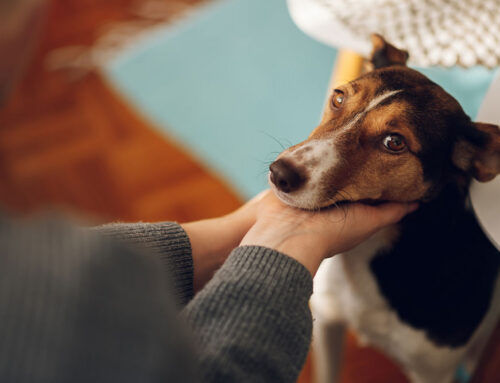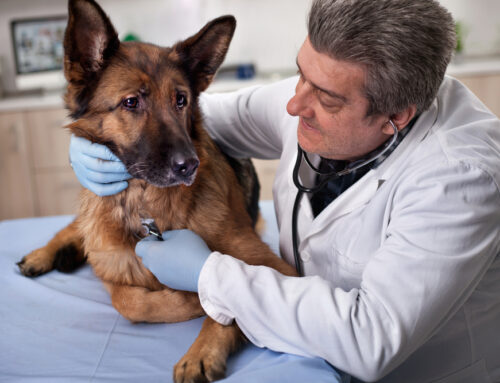Understanding Hypothyroidism and Hyperthyroidism in Pets: A Guide for Dog and Cat Owners
When a dog starts gaining weight without explanation or a cat suddenly becomes restless and demanding, thyroid disease may be to blame. Changes like these often sneak up gradually, but they can signal serious endocrine issues if left untreated.
Hypothyroidism in dogs and hyperthyroidism in cats are among the most common hormonal disorders seen in veterinary medicine, yet they’re often misunderstood. At Guam Pet Hospital, pet owners will get clear answers and gain a trusted partner that will detail what these conditions mean, how they progress, and how to keep pets comfortable and healthy for years to come.
Where Thyroid Disease in Pets Begins
Your pet’s thyroid gland is located in their neck. This gland is responsible for regulating your pet’s metabolism and influences nearly every organ in their body, from the heart to the skin and digestive system.
When the thyroid produces too little hormone, it slows everything down. When it produces too much, the body goes into overdrive.
- Hypothyroidism: Most common in dogs, where the thyroid is underactive.
- Hyperthyroidism: Most common in older cats, where the thyroid is overactive.
Without treatment, both of these thyroid conditions can lead to serious health complications for pets, but they’re very manageable when caught early.
What Causes Thyroid Disease in Pets?
Thyroid disease in pets can develop for a variety of reasons, with causes often differing between dogs and cats based on age, breed, and underlying health conditions.
Hypothyroidism in Dogs
In dogs, hypothyroidism is usually caused by autoimmune disease or gradual shrinkage of the thyroid gland. Some breeds are more at risk than others.
Risk factors:
- Middle-aged dogs (4–10 years old)
- Medium to large breeds like Golden Retrievers, Doberman Pinschers, Boxers, and Cocker Spaniels
Hyperthyroidism in Cats
In cats, hyperthyroidism is most often due to a benign tumor on the thyroid gland called an adenoma. A small percentage of cats may develop malignant tumors, but this is rare.
Risk factors:
- Cats over 10 years old
- Possible environmental or dietary triggers under study
Why Early Diagnosis Is Important with Thyroid Disease
Both forms of thyroid disease progress over time, gradually affecting the heart, kidneys, and other organs. Early diagnosis means:
- Less risk of secondary conditions like heart disease and hypertension
- Fewer long-term complications
- Improved comfort and quality of life for your pet
Routine checkups and preventive bloodwork make a big difference.
Signs and Symptoms to Watch For
Knowing what to look for can help pet owners catch thyroid issues before they become advanced. The following are some of the common signs of thyroid problems in dogs and cats:
Common Signs of Hypothyroidism in Dogs
- Unexplained weight gain despite no change in diet
- Lethargy, sleeping more, or reduced interest in walks and play
- Cold intolerance (seeking warm places to lie down)
- Skin infections, thinning hair, or dry coat
- Recurring ear infections
Common Signs of Hyperthyroidism in Cats
- Noticeable weight loss even with an increased appetite
- Excessive drinking and urination
- Restlessness or hyperactivity
- Vomiting or diarrhea
- Rapid heartbeat or new heart murmurs
- Behavioral changes, such as irritability, especially in senior cats
How Vets Diagnose Thyroid Disease
At Guam Pet Hospital, thyroid disease diagnosis involves multiple steps:
- A physical exam, which involves palpating the thyroid gland, checking heart rate, skin and coat condition, and overall body condition.
- Bloodwork, which could include TSH (Thyroid Stimulating Hormone) Total T4 (Thyroxine) and Free T4 levels.
- Additional tests to check kidney and liver function.
- In some cases, ultrasound or nuclear scans may be used to locate abnormal thyroid tissue.
Routine preventive tests for senior pets can catch these changes before symptoms become obvious.
Treatment Options for Thyroid Conditions
Thyroid conditions in pets are highly treatable, and most dogs and cats respond well to care tailored to their specific needs. The following are a few common thyroid treatments your pet may receive:
Hypothyroidism in Dogs
Treatment usually involves:
- Daily thyroid hormone medication (levothyroxine)
- Regular blood tests to check hormone levels
- Adjustments to medication based on results
Most dogs respond well to thyroid treatments, regaining energy and shedding extra weight within weeks.
Hyperthyroidism in Cats
Several treatment paths for cats are available, including:
- Medication: Daily pills or transdermal gels like methimazole
- Radioactive Iodine Therapy: A single treatment that can cure the disease by destroying overactive tissue. This must be performed in a specialized facility.
- Surgery: Removal of the affected thyroid gland (thyroidectomy)
- Dietary Therapy: Special iodine-restricted diets help some cats
Managing Daily Life with Thyroid Disease in Pets
Thyroid disorders often need lifelong monitoring. Most pets thrive when owners:
- Give medication as prescribed
- Monitor for changes in weight, coat, appetite, and energy
- Schedule regular follow-ups and lab work
- Adjust the home environment, such as providing warm beds for hypothyroid dogs or multiple water bowls for hyperthyroid cats
FAQs About Pet Thyroid Conditions
Is thyroid disease curable?
Hypothyroidism in dogs is lifelong but highly manageable and hyperthyroidism in cats can be cured with radioactive iodine therapy or surgery.
Are thyroid medications safe?
Yes. With regular blood tests and dosage checks, thyroid medications are safe for long-term use.
How soon will my pet feel better?
Most pets improve within a few weeks. Some need dosage adjustments to reach ideal hormone levels.
Should my healthy pet be screened for thyroid disease?
Yes, especially as pets age. Annual exams and routine bloodwork can catch issues early.
Next Steps: Supporting Your Pet’s Thyroid Health
Thyroid disease in pets can feel overwhelming, but with the right veterinary care and proactive management, most pets go on to live full, comfortable lives. At Guam Pet Hospital, experienced veterinarians and a compassionate team partner with you every step of the way.
If your dog or cat is showing signs of thyroid imbalance, don’t wait. Contact us or schedule an appointment to discuss testing and personalized treatment options. Together, we can help your pet feel like themselves again.









Leave A Comment